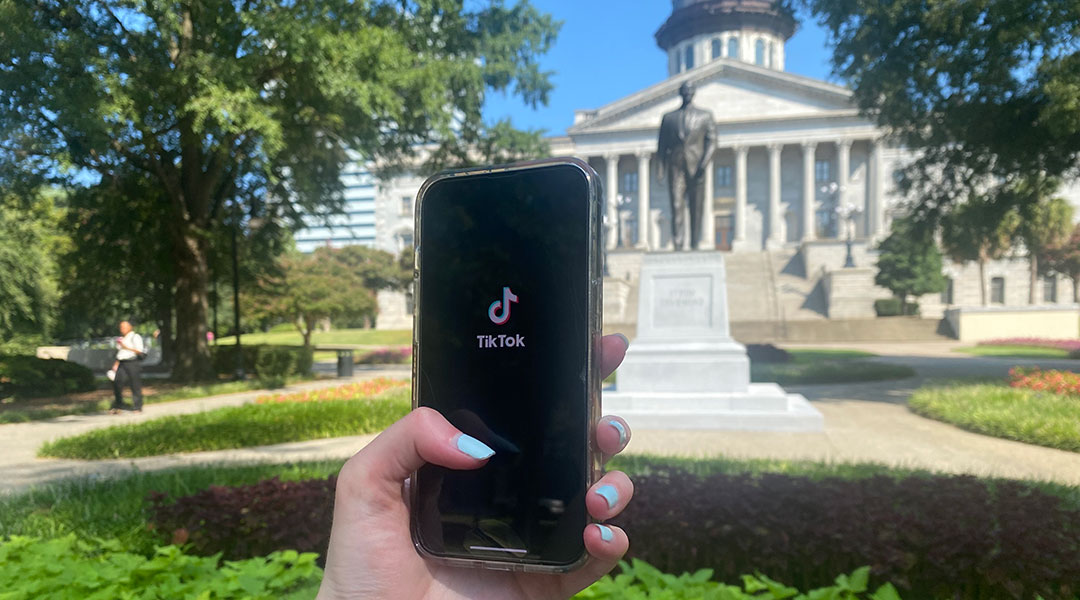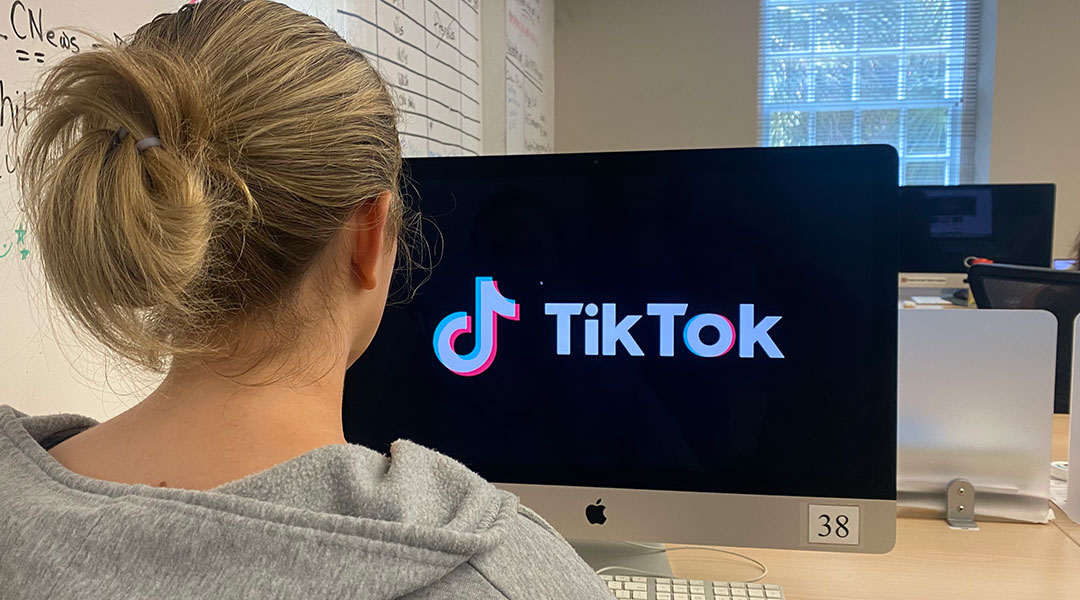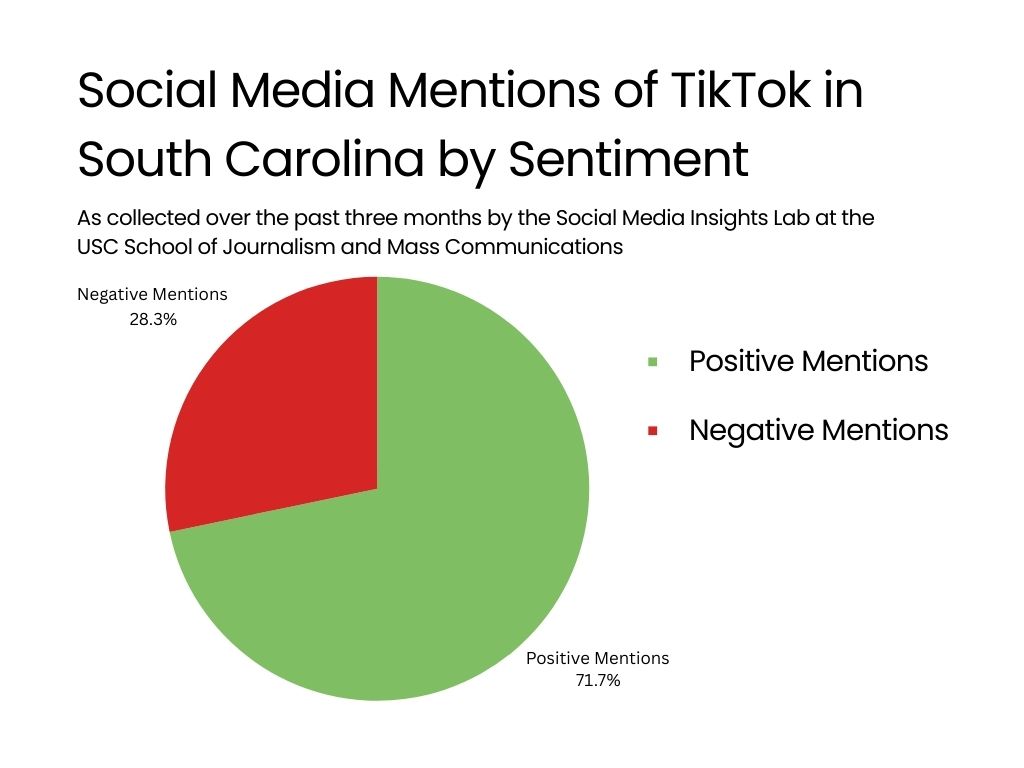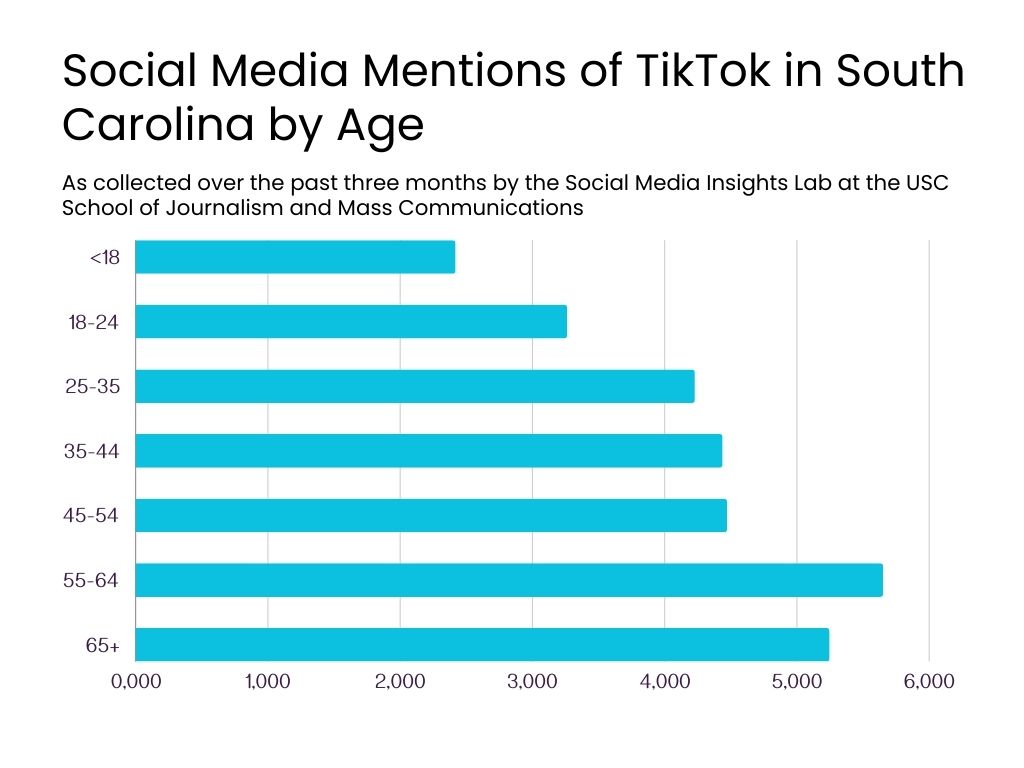The South Carolina state Legislature passed a budget provision that would bar students from using TikTok on school devices. (Photo illustration by Mollie Naugle/Carolina News & Reporter)
High school government teacher Patrick Kelly can always tell when his students are filming a TikTok.
“Seeing students with a phone that’s positioned on a desk and you’ve got two or three students dancing in front of the phone, that’s a pretty good giveaway,” Kelly said.
But this is a sight Kelly will no longer see after the South Carolina legislature passed a measure compelling schools to block TikTok on all state-issued devices – or lose almost half their funding.
“Since about 45% of local school budgets come from the state, that’s effectively a prohibition,” Kelly said.
While most schools have already blocked social media on their devices, this is the first time a ban has been enforced by legislation. Many are wondering why.
“Why just TikTok?” said Sherry East, president of the S.C. Education Association, a professional organization for educators. “Was that because it’s owned by China, or are we concerned about China in our classroom getting data? Are we concerned about instructional time? I’m not sure which way that goes.”
While many people agree that TikTok needs regulation in schools, some are skeptical as to whether the budget provision will have any significant impact in classrooms. The budget provides no guidance on how to enforce the rule, making East wonder about its effectiveness.
“It makes us feel good saying that we’re banning TikTok,” she said. “Is there really any teeth in that? What are we really going to do if we find TikTok on a state-issued device? Just take the device or suspend the child?”
The new measure, passed in April as part of the state budget for the 2024-25 fiscal year, signifies another blow in the state government’s fight against TikTok. In December 2022, the Department of Administration banned the app from all government devices at the request of Gov. Henry McMaster. Its use has since been blocked on campus Wi-Fi at universities across the state. McMaster proposed banning state universities from managing their own TikTok accounts, but his recommendation was not incorporated into the final budget.
Jennifer Rainville, an education policy attorney at the SC Appleseed Legal Justice Center, said a ban within school districts and on state-funded devices would not encroach on students’ rights.
“It doesn’t really give me a whole lot of pause when it’s very clear that it’s on a school-issued device,” she said. “They have the ability to restrict what you look at and how you use it.”
TikTok bans are gaining traction on the federal level, too. In April 2024, President Joe Biden signed into law legislation that could potentially ban TikTok unless it is sold to an American company. Many are wondering if that could pose a threat to freedom of speech, including University of South Carolina journalism and law professor Dr. Eric Robinson.
“It’s not the content of the speech they’re really getting at, it’s the venue,” Robinson said. “And is there adequate justification for that? That’s going to be the legal question.”
Robinson noted, though, that there is “a very high threshold” to uphold the legality of a ban on social media platforms on a federal level. While states are free to ban the site from government-owned devices, it has not yet been determined whether a federal ban would hold up in court.
“There have been very few instances where entire venues have been locked away, and as far as I know, courts have not upheld those things,” he said. “Very little has passed that threshold so far.”
Even if TikTok is no longer allowed in South Carolina schools, Kelly said the app will still have a place in his classroom.
“Social media has become increasingly ingrained into my class when we study media,” Kelly said. “It’s simply impossible, I believe, to teach about the intersection of media and politics in the year 2024 if you don’t talk about the way social media has reshaped the way Americans consume information about their political system.”
A new legislative measure bars South Carolina students from using TikTok on state-issued devices. (Photo illustration/Geri Johnson/Carolina News & Reporter)
An analysis of South Carolina social media users’ sentiments toward TikTok in the past three months (Graphic by Mollie Naugle/Carolina News & Reporter)
The South Carolina legislature passed the provision in April as part of the state budget. (Photo by Geri Johnson/Carolina News & Reporter)
An analysis of the ages of South Carolina social media users who mentioned TikTok in their posts in the past three months (Graphic by Mollie Naugle/Carolina News & Reporter)
ABOUT THE JOURNALISTS

Geri Johnson
Johnson is a journalism and sociology double major at the University of South Carolina. She is a communications intern at USC’s Molinaroli College of Engineering and Computing. After graduating, she hopes to attend law school.

Mollie Naugle
Mollie Naugle is a junior journalism student at the University of South Carolina, minoring in leadership studies. She enjoys writing about culture and politics and hopes of exploring the intersection of the two. She is originally from the suburbs of Philadelphia, and enjoys reading, listening to music and spending time with friends and family in her free time.






